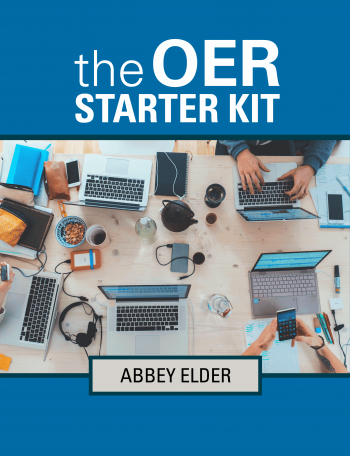

Learn more about OER with The OER Starter Kit! This starter kit has been created to provide instructors with an introduction to the use and creation of open educational resources (OER). Although some chapters contain more advanced content, the starter kit is primarily intended for users who are entirely new to Open Education.
Adopt, Adapt, or Create?
There are various options available to faculty interested in including OER in their courses.
Adopt
If there are high quality, vetted Open Educational Resources available on the topic your course covers, and you do not feel the need to edit or otherwise alter them for use in your course, you might consider adopting them for use "as is." Adopting is the simplest way of including OER in your course, and the least time intensive.
Adapt/Build
If there are OER available on the topic your course covers, but they are dated, too broad, or contain information which is beyond the scope of your course, you may want to consider adapting the materials. After checking that the Creative Commons license attached to the materials allows for adaptation, you may choose to edit the materials to tailor them to your course.
Alternately, if there are OER available on the topic your course covers, but no single resource is broad enough to cover the needs of your course, you may want to consider building a "course pack," a selection of various OER, free online materials, and websites which make up the resources for use in a course. These packs can be extremely versatile and adaptable resources.
Create
If there are no high quality OER available on your topic or if you have course materials which you believe are superior to the OER available to you online, you may want to consider creating or licensing your own course materials. Creating Open Educational Resources can be as simple as openly licensing and sharing a syllabus you currently use or sharing lesson plans on OER repositories like OER Commons.
Other OER creation processes, such as publishing open textbooks, can be more complex but if you want to explore some options, try these:
The Open Education movement is built around the 5 R's of open content:
Retain: The right to make, own, and control copies of the content.
Reuse: The right to use the content in a wide range of ways (e.g., in a class, in a study group, on a website, in a video)
Revise: The right to adapt, adjust, modify, or alter the content itself (e.g., translate the content into another language)
Remix: The right to combine the original or revised content with other open content to create something new.
Redistribute: The right to share copies of the original content, your revisions, or your remixes with others.
This material is based on original writing by David Wiley, which was published freely under a Creative Commons Attribution 4.0 license at http://opencontent.org/definition/
CC Licenses and Rights
To ensure that users are able to remix and reuse OER, Creative Commons licenses are often used to communicate the rights which creators would like to retain. Creative Commons licenses give others a variety of permissions upfront, making a faster and more transparent process. Adding CC licenses to your work can help ensure that your work is shared or reused as you see fit. For example, some creators may wish to share their work, but not to allow users to sell adaptations of their work.
The most common CC license is the Creative Commons Attribution license (CC BY). This license allows users to adapt and reuse content with limited restrictions. The only requirement for reusing a CC BY-licensed work is that any new work created must provide attribution to the original creator and a link to the original work.

For more information, visit Creative Commons.